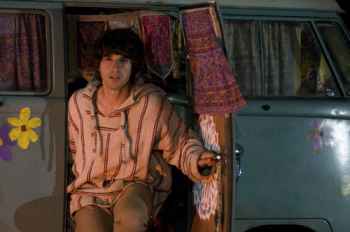- MENU
- HOME
- SEARCH
- WORLD
- MAIN
- AFRICA
- ASIA
- BALKANS
- EUROPE
- LATIN AMERICA
- MIDDLE EAST
- United Kingdom
- United States
- Argentina
- Australia
- Austria
- Benelux
- Brazil
- Canada
- China
- France
- Germany
- Greece
- Hungary
- India
- Indonesia
- Ireland
- Israel
- Italy
- Japan
- Korea
- Mexico
- New Zealand
- Pakistan
- Philippines
- Poland
- Russia
- South Africa
- Spain
- Taiwan
- Turkey
- USA
- BUSINESS
- WEALTH
- STOCKS
- TECH
- HEALTH
- LIFESTYLE
- ENTERTAINMENT
- SPORTS
- RSS
- Movie Reviews

Demetri Martin
As varied as his films have been -- from "The Wedding Banquet" to "The Ice Storm" to "Crouching Tiger, Hidden Dragon" to "Brokeback Mountain" -- director Ang Lee has never made a bad one, and the genial comedy "Taking Woodstock" certainly doesn't break his streak.
Expectations must be set appropriately, however.
This is very light material, and, unusually for a Lee picture, not everybody in the ensemble appears to be acting in the same universe, let alone the same story.
On the other hand: It's fun.
The film is based on Elliot Tiber's memoir. Much of the book concerned the young man's unlikely role in the ultimate location and launch of the 1969 Woodstock festival (his folks owned a little motel in White Lake, N.Y., in the Catskills). In the book, Tiber's secret life (secret from his family, that is) as a newly politicized gay man in Greenwich Village also took up a good deal of narrative real estate.
Not so in the film. Screenwriter James Schamus doesn't do anything as stupid as shove Elliot back in the closet, but this is no "Brokeback Catskills Mountain." It's a mosaic -- many characters, drifting in and out of focus -- stitching the story of how the peace-and-music bash fell together as it bounced in the haphazard planning stages from its originally scheduled Wallkill, N.Y., location to a cow pasture in White Lake. (Eugene Levy, working hard to restrain his natural comic ebullience, plays the dairy farmer, Max Yasgur.)
Demetri Martin plays Elliot, who arranges the permits and struggles between his duties as a put-upon son and his yearnings as an adult on the cusp of ... something. Martin, more an amiable host than a fully fleshed-out emotional center, works in one key; on the other end of the broadness spectrum, we have the British performers Imelda Staunton and Henry Goodman dancing on the edge of caricature as the owners/operators of the dump called El Monaco, saved from bankruptcy by the influx of hippies and money. Liev Schreiber swans around winningly as a cross-dressing ex-Marine bodyguard; Emile Hirsch plays a Vietnam vet coping with depression, despair and memories of his long-gone youth.
The limitations here are mostly in the writing. The humor, even with the considerable nudity and suspiciously occasional drug use, remains mild and familiar. (Sample bit: Elliot's tightly wound immigrant parents cut loose after four pot brownies apiece.) By design "Taking Woodstock" operates from the perspective of those who came for the music but barely got close enough to hear it. This angle suits Lee's natural tendency to side with the sidelined, the outsiders.
Lee indulges in a fair bit of split-screen activity, an ode to Michael Wadleigh's "Woodstock" concert film. His most satisfying image is a tracking shot, free of split-screen artifice, following Elliot on the back of a police motorcycle, snaking along a traffic-jammed stretch of road, trying to get to the concert before it becomes history. There's another memorable shot, far briefer, that only a director who went to school at the
MPAA rating: R (for graphic nudity, some sexual content, drug use, and language).
Running time: 2:00.
Starring: Demetri Martin (Elliot); Henry Goodman (Jake); Imelda Staunton (Sonia); Jonathan Groff (Michael Lang); Eugene Levy (Max Yasgur); Emile Hirsch (Billy); Liev Schreiber (Vilma); Dan Fogler (Devon).
Directed by Ang Lee; written by James Schamus, based on the book by Elliot Tiber with Tom Monte; produced by Schamus, Lee and Celia Costas. A
BOOKS | TELEVISION | MUSIC | THE ARTS | MOVIES | CULTURE
© Tribune Media Services